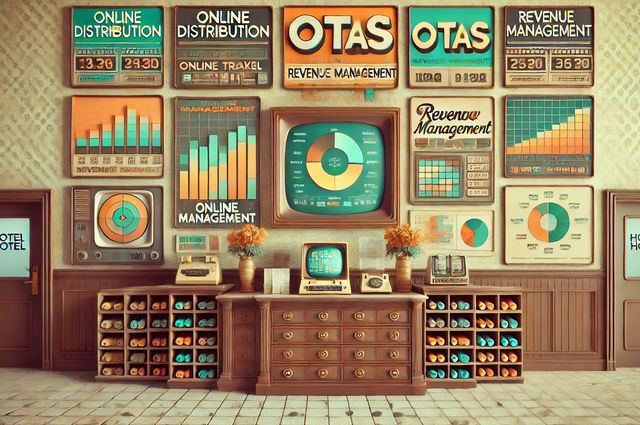Should hoteliers forget about direct online distribution and use the OTAs as their exclusive distribution channel?
15 experts shared their view
A recent heated discussion on LinkedIn was a clash between two schools of thought regarding direct online distribution in hospitality.
One school of thought representatives claim that they "really don't understand the whole thing about direct booking and loyalty… " They further claim that travelers are loyal to and trust OTA platforms like Booking..com, Expedia, Airbnb, etc. According to them there are an emerging number of hotel owners that are now linking their property websites' "Book Now" buttons directly to the OTAs since "It saves them the headache of managing it all themselves."
Experts from the other school of thought counter the above by declaring the use of OTAs as the booking engine on the property site is the most retrograde thing the industry has ever heard and doing so is definitely the lazy hotelier's way of dealing with online distribution.
The question is: should hoteliers forget about direct online distribution and use the OTAs as their exclusive distribution channel?
I was shocked by the claim that there were hoteliers linking their property websites' "Book Now" buttons directly to the OTAs. In hospitality we had a few cases like these back in the year 2000. But now, 25 years later?
First, direct bookings are cheaper than OTA bookings. For 20 years at my company NextGuest (now merged with Cendyn) we measured the true cost of direct online bookings across our 5,000 hotel clients, mostly independent hotels, midsize and smaller boutique brands, The average cost was consistently 4.25%-4.5%, including property website amortized over 36 months, website maintenance, hosting/analytics, consulting services, digital marketing (SEO, SEM, online media, CRM marketing, metasearch, etc).
Compare this to OTA take rates of 25% and more, reaching 32%-33% adding discounts to the OTA loyalty members (360,000 hotels already provide those).
Second, direct online bookings are 10x more important than OTA bookings since they are first-party data generators! The property's first-party customer data is the only "single source of truth" of your guests that can be used in customer service, personalization, CRM communications and marketing automation in the pre-, during- and post-stay, and digital marketing, needed to improve dramatically the customer experience, efficiency and profitability.
OTAs are not a strategy - they're a costly crutch.
The idea of abandoning direct online distribution in favor of exclusive reliance on OTAs is not only shortsighted — it's dangerous. OTAs are useful tools in a diversified distribution strategy when demand is not strong, but surrendering full control to them is a fast track to eroded margins and loss of brand equity. Yes, travelers may trust OTAs for search, but that's because the industry hasn"t done enough to earn that trust back.
Relying exclusively on OTAs means giving up guest data, loyalty-building opportunities, and long-term profitability - for good. Embedding OTA links into your hotel's own website means paying commission on every single booking. Might as well just hand them the password to your bank account. I can't believe some hoteliers are still considering this as a strategy. This speaks to the lack of understanding and awareness. Which means: there's still so much we need to do to educate an average hotelier...
Distribution isn't just about convenience; it's about control. OTAs should be your partners, not your puppet masters. Hoteliers who want a future must stop outsourcing their brand and guest relationships and start owning them.
Handing your business over to a lottery outcome. Sounds like a great idea!
One should not outsource something mission critical to the business. If selling product isn't mission critical, then I suppose knock yourself out!
There is no doubt that competing is a tough business. But the moment you choose to cease competing, then you are no longer a competitor in the competition.
Distribution is an important arrow in the quiver of sales processes. But it is not the only arrow.
This concept feels extremely forced and doesn't accurately represent reality. I'm curious which hoteliers the author has been speaking with, as I find it hard to believe there's a significant movement of property owners deliberately redirecting their "Book Now" buttons to OTAs with zero interest in managing direct bookings. While such individuals might exist somewhere, presenting them as representing a growing trend or majority perspective seems disingenuous.
Second, there's a fundamental confusion in the statement:
really don't understand the whole thing about direct booking and loyalty.Direct bookings and loyalty are two distinct concepts. While often managed together as part of an overall strategy, they remain separate elements requiring different approaches.Finally, this entire framing presents a false binary, as if hotels must choose between either complete OTA dependence or full direct booking autonomy. It ignores the nuanced middle ground where most successful properties actually operate. This kind of oversimplified, all-or-nothing discourse feels like we're being transported back 25 years in the industry conversation.
I would argue that this is a risky strategy. OTA's are marketplaces. And in marketplaces rules change often unpredictably. And putting all eggs in one basket with changing rules is not a good idea. A direct distribution strategy executed professionaly will normally yield a lower distribution cost. Not always though. Direct is not always best. But even so having a balanced channel and business mix is the right strategy in today's dynamic environment.
For a traditional branded property, the answer is clearly no. Brands by definition are in the distribution business and the fee structure in most franchise agreements precludes a heavy reliance on OTA contributions if the property has a hope of being profitable.
For an independent property, it comes down to brand power - meaning the ability for a property to garner loyal direct business. In the absence of established brand power (e.g., a new property), a heavier reliance on OTA contribution has some advantages such as exposure to a wider audience, pay-for-performance economic model plus the ability to leverage technology and marketing opportunities. The downside would be in the form of high commissions, inability to nurture direct customer relationships (think loyalty and understanding of guest demographics), lack of brand control and placement on 3rd party sites, and other risks such as policy, algorithm changes and commission increases.
Most successful properties don't rely completely on OTA's, but rather strike a balance within their distribution strategies by broadening participation across several channels. Of course, this strategy does require a more sophisticated approach and there are resourses out there (our firm included) that can help with this challenge.
The debate over direct bookings versus exclusive OTA reliance boils down to a profitability and scale equation. For independent hoteliers, focusing on a few key OTA partnerships can be a pragmatic way to leverage their marketing reach and simplify operations, especially given the costs of building and driving traffic to a direct booking engine. This shouldn't preclude exploring targeted direct booking opportunities where feasible.
On the other hand, large hotel brands should prioritize and heavily invest in direct online distribution. The economies of scale make this the most profitable channel, fostering brand loyalty and providing crucial guest data. If all bookings occur through OTAs, the very value of the brand is called into question. Ultimately, a balanced strategy, tailored to individual hotel scale and resources, is the most effective strategy, rather than a complete abandonment of direct guest relationships.
Short answer: Absolutely not. While OTAs offer reach and bookings (billboard effect), relying exclusively on them is risky. OTAs' high commissions eat into profitability, whilst direct bookings are crucial for higher margins, guest data ownership, and stronger brand loyalty. It's about finding a healthy balance.
With direct channels, hotels control the guest journey, allowing upselling, cross-selling, and loyalty-building initiatives that boost ancillary revenue and customer lifetime value. Direct bookings also lower customer acquisition costs over time, improving overall financial health.
Hoteliers must maximize every guest touchpoint. Giving all control to OTAs means losing upsell opportunities, ancillary sales, and the chance to truly differentiate your brand.
OTAs should remain a key part of the distribution mix, but direct online sales must be actively nurtured with smart marketing, loyalty programs, and personalized experiences.
The key? Finding the balance that serves you best. Use OTAs for reach, but invest in your direct channels for profitability and long-term success.
Whether hoteliers should rely exclusively on OTAs depends entirely on their core strategy. Consider the heads-in-beds hotelier focused mainly on transactions. Filling rooms with minimal hassle. For them, the individual guest relationship is secondary. They rely on OTAs, treat commissions as a business cost, and even directly linking their site's booking button seems pragmatic. Competing only on price, they find outsourcing distribution simpler and more valuable than direct guest data or relationship building. Compare this to the hotelier, whose focus is entirely on the guest. They prioritize hospitality by aiming to provide a superior, personalized experience. This guest-centric approach requires rich guest data, best gathered through the hotel's website and direct booking engine. Such data enables deep personalization, unique offers, and loyalty building, and it justifies premium pricing by delivering exceptional value. For these hoteliers, abandoning the direct channel is unthinkable, as it means losing control over the vital guest relationship and the ability to differentiate beyond mere price. Thus, the choice hinges on whether the hotel prioritizes transactional ease or guest-centric value creation.
The real question isn't whether hoteliers should go all-in on direct distribution.
The real question is: what is your cost per acquisition?
If the CPA for a direct booking is lower than—or even comparable to—the OTA commission, direct must be your priority, no hesitation. But if you're paying more to acquire a direct booking than you would by paying an OTA commission, pragmatism wins: you use OTAs.
This is not about ideology. It never was, and it never will be.
What matters isn't where the booking comes from—it's how much it costs you to get it.
Sure, in a perfect world, we would disintermediate completely, but, in the real world, you optimize every channel, including OTAs, if (and only if) it makes financial sense.
In short:
- Monitor your CPA mercilessly.
- Defend direct if/when it's efficient.
- Leverage OTAs if/when it's not.
Using OTAs as the exclusive online distribution channel is probably the worst idea I have heard in a long time. Why would any hotel owner/ DOSM/ DORM link the "Book Now" button to an OTA? That is probably even worse than having no direct online distribution as the hotel will lose ranking with any other OTAs.
Direct distribution, OTAs, negotiated accounts all play an important role in the hotel market mix. Each channel opens opportunities that other platforms may not be able to provide. Each hotel needs to make an investment into CRM, digital advertising, social media and then provide opportunities to book at various points in the guest journey. At the same time, they also need to use the OTA distribution channels to reach segments the hotel can't easily attract itself.
Direct distribution is not just about saving a few percentage points on commissions.
It's about building your brand equity, owning your customer relationships, capturing valuable data, and creating repeat business without paying a toll each time. It's the difference between owning your guest and renting your guest.
I obviously don't agree with using OTAs as booking engines, but I understand that some hoteliers struggle with managing distribution—especially where there is a lack of both human and financial resources.
In my view, these two approaches are parallel lines that will never intersect, as they belong to fundamentally different worlds. On one side, there are well-structured hotels with the capability and expertise to manage their own website, booking engine, digital marketing campaigns, pricing strategy, and everything necessary to maintain a balanced distribution mix and drive direct bookings.
On the other side, there are less structured properties where the lack of skills and resources—both human and financial—makes it difficult to navigate the complex distribution landscape. As a result, many hoteliers throw in the towel and opt for the easier, albeit less profitable, path.
Beyond the distribution costs and the lack of personalization inherent in the streamlined approach offered by OTAs, they are also giving up pricing control and all the advantages tied to direct sales: opportunities for upselling, guest relationship management, and personalization of the customer experience, as well as additional revenue streams beyond simple room occupancy.
I think that there is a place for both direct and third-party booking in hospitality, as there are benefits to both methods. For direct booking: The hotel maintains control of its inventory and owns the guest relationship, can easily make changes to the reservation, and saves on OTA channel expenses. On the other hand, OTAs: Have greater marketing reach and brand name recognition (in certain markets) and standardize the booking process for guests. Additionally, many hotels don't have the ability to take reservations and/or payment information. These are mostly independent, international hotels. In those cases, they do consider OTAs to be their booking engine. In some cases, the lack of consistent internet connectivity is prohibitive (such as some hotels I worked with in Africa); in others, the cost and effort of maintaining their own IBE is greater than the OTA commission (I worked with some like this in Asia and Latin America). The ideal solution is for hotels to maintain both channels in order to capture the widest possible audience. But when direct booking is not an option, it is fortunate that hotels can count on the OTAs to pick up the slack.
Let us break it down with an analogy:
Ford, BMW or Fiat could supply cars through Uber for transportation as a service. However, if these brands only sold cars through Uber, they would lose the direct connection with people who drive the cars, gaining no insight into customer preferences.
Similarly, in hospitality, only hoteliers who know their guests can provide the ultimate customer experience, which translates into revenue and profit. If hotels rely solely on OTAs, they risk becoming merely a listing on a platform, losing the direct connection and valuable customer insights.
I believe a balanced approach, as suggested by Dara Khosrowshahi, former CEO of Expedia Group, is ideal; OTAs focus on bringing guests to hotels, while hotels actively work to retain that relationship.
Hoteliers can leverage the reach of OTAs for initial discovery, reaching a wider audience. However, it is crucial for hotels to then add long-term value for clients, fostering loyalty and repeat business.
Hotels should make their websites easy and seamless like OTAs to make direct bookings easier, including activities, local attractions, transfers, and even Pay at Hotel. Such an approach enables consistent brand experience and personalised services, ultimately facilitating a more sustainable and profitable business.















